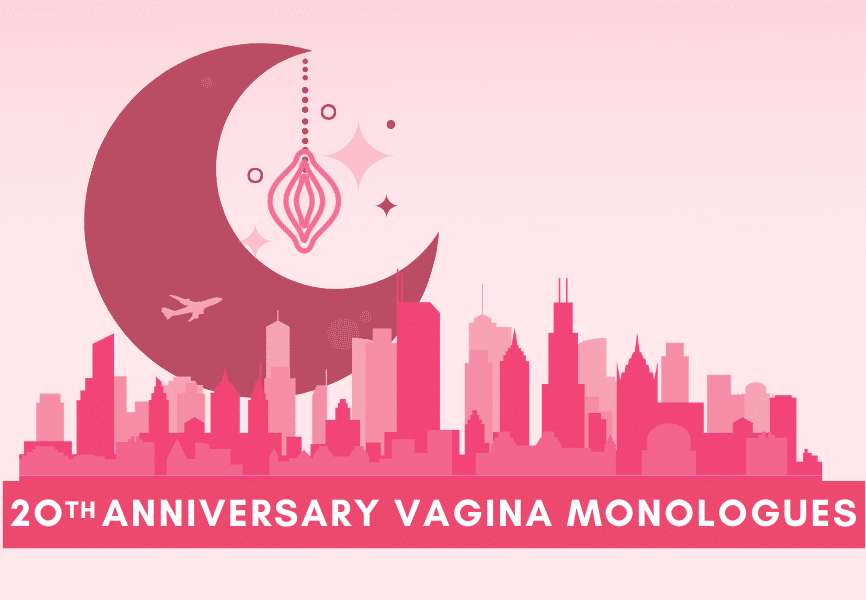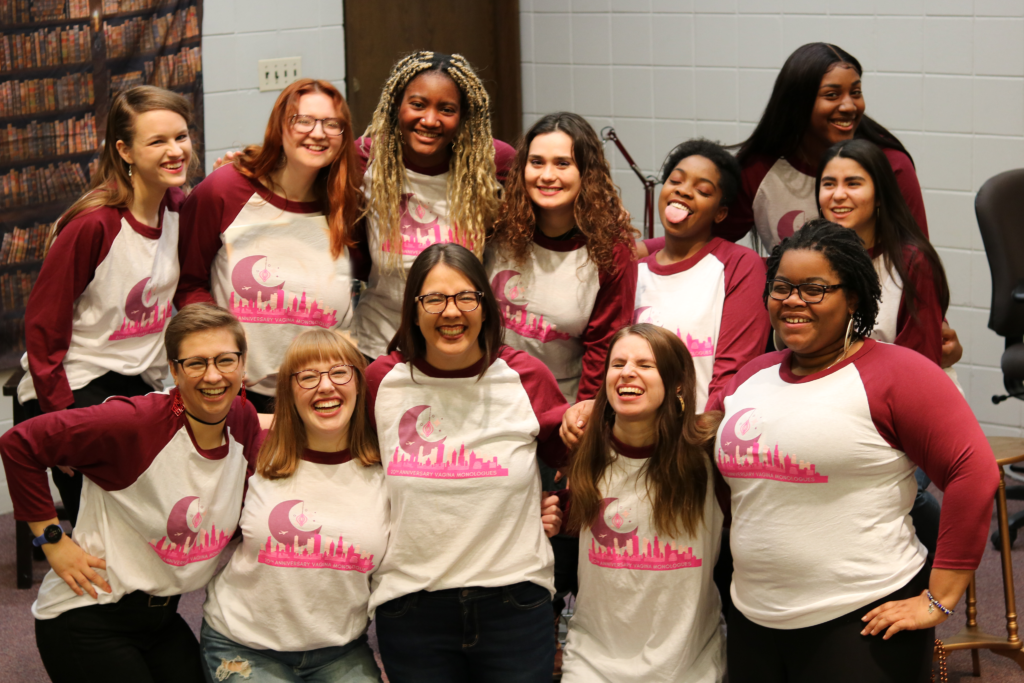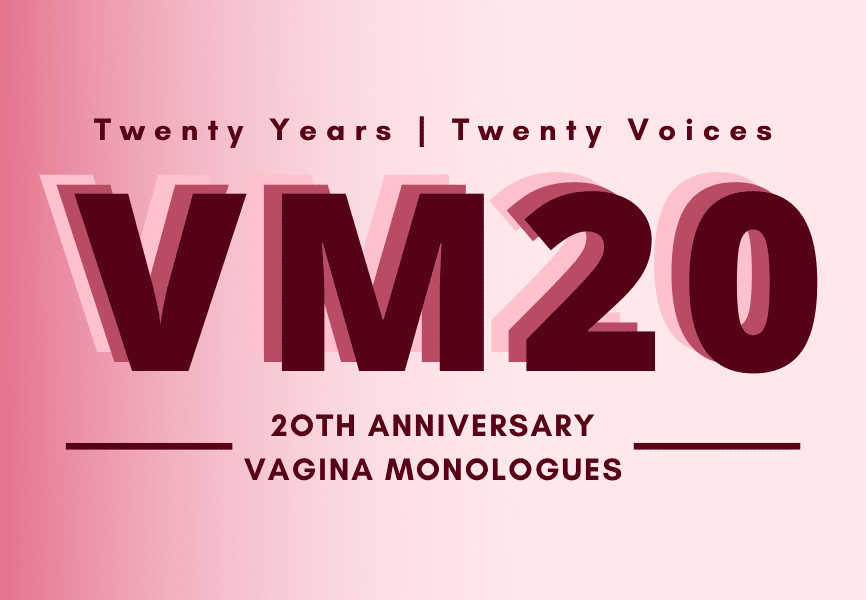This year marks the 20th anniversary performance of The Vagina Monologues at DePaul University. At this landmark show directed by Genera Fields and Nina Rose Wilson, students will present a variety of monologues, and second-year MAWRD student Megan Palmer will perform an original monologue.
First performed in 1996, The Vagina Monologues began as an episodic activist play by Eve Ensler, who wrote the monologues based on interviews with more than 200 people. Since then, The Vagina Monologues has been performed on hundreds of college campuses each year, and performances may feature stories that are unique to each respective campus and the performers in the show.
“I am so excited for stories about queerness and blackness and disability and more,” said Nina. “The cast we have this year is more than I could ever ask for and they bring so much light to this production. What I can say is audiences shouldn’t expect the traditional Vagina Monologues! The show as a whole is about community stories and healing as marginalized folks.”
We had a chance to speak with Megan before the show to learn more about her experiences composing and performing her own monologue, as well as in her role as graphic designer for the show.
Describe the monologue you will perform at The Vagina Monologues. How would you characterize the story and voice of this piece?
The Vagina Monologues was written in ’96 and shares the stories of hundreds of people talking about their vaginas. But… a lot has changed since then. Culture, language, our concept of gender, all of these things are constantly changing, which is why it’s really cool that the past few years of DePaul’s productions of The Vagina Monologues have empowered its performers to write their own monologues or modify the originals.
I chose to write my own—actually, I almost chickened out of it, really. I wrote this piece originally months ago on the bus, and when I emailed the directors about auditioning, they asked, “What monologue will you be reading or do you have your own?” Immediately, before I could chicken out, I wrote back, “I wrote my own piece!” And then, all of a sudden, I had to take ownership for this thing I had written.
I don’t want to give too much away, but it’s about motherhood. I can only describe writing and reading it as a storm of some kind. A piece that I hope crashes through your front door, wakes you up with this joy and humor, and then hits you in the gut to remind you that you’re human. It’s been a really cathartic thing for me to write, to help me process some of this… inter-generational pain women carry and how we try to come out on the other side of care work with our hearts and bodies intact. Not unscathed, but intact.
How are you using your experiences and knowledge from the WRD program in your involvement with The Vagina Monologues?
First, I relied a lot on my experiences in WRD when creating the marketing materials that are being circulated to promote the show. I was asked to do the graphic design and marketing, and I don’t think a day goes by when I’m not thinking back to something I learned in Lisa Dush’s Content Strategy course. It’s been an absolute blast getting to create flyers, programs, t-shirts, social media posts, and everything in between.

The second answer, I think, is about storytelling. While in the WRD program, I’ve thought a lot about what it means to tell stories. How to create platforms and spaces engage with stories, how to create space for marginalized folks to write and share their own stories, and how to dialogue around those stories. The Vagina Monologues does just that. We create this space for a wide range of people to come in, to own their stories, and to talk and negotiate back and forth with the original monologues, partaking in this 20+ year conversation.
As a group, we talk about language, content…We look at the original monologues as this corpus of stories that feel co-opted, and de-contextualized by a white, cis woman (Eve Ensler). Ensler originally conducted interviews to write these pieces, and/but then she performed them in her own voice, in her own body, embodying her privilege and her less than inclusive, pretty essentialist thoughts about what it means to be a woman.
And as a cast, we grapple with this. We talk about how to perform these pieces or modify them or to not perform them at all, thinking about what performing this show with this history means for us in our own bodies, in our own lives, and in our own communities. So I fall back on this language that WRD has given me for talking about stories and narrative, embodiment and ownership, authorship and audience, and I use that to support my fellow writers, these people who are tackling hard questions and are just trying to put on the best, most authentic, inclusive, accessible, honest show possible.
What more would you like to share about your experience with The Vagina Monologues?
It’s important to write. It’s important to surround yourself with communities that support you in your storytelling and writing endeavors. The Vagina Monologues has surrounded me with people who didn’t know me, but who trusted me with their stories and who, without question, held out their hands to catch the broken pieces of mine. That might not be something that you can see on stage— it’s probably not the thing that anyone cares about when watching the show—but it has made my lived experience in this brown, grieving, lonely body so much lighter. That doesn’t exist everywhere.
Find the people who will catch and hold and honor your story, too.

See The Vagina Monologues on February 7, 8, and 9 at 7:00 pm at Cortelyou Commons (2324 N. Fremont St.). Tickets are available for $10 on Eventbrite and at the door.
Are you a WRD major, minor, or MA student? Have an upcoming event you want to share with the WRD community? Doing something awesome or empowering with your knowledge from WRD in or outside of the classroom? Then email wrd@depaul.edu and you may be our next student spotlight!

Thanks so much for asking me to share my experience, Maddy! So excited to share this event with everyone!!